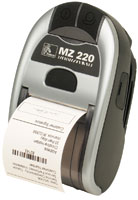Bluetooth Mobile Printers Keeps Blue Devils Mobile
Bluetooth Mobile Printers Keeps Blue Devils Mobile
 Challenge
Challenge
Whether watching their beloved Blue Devils play basketball or going about their business on campus, students at Duke University in Durham, N.C., are seldom standing still. The university’s widespread use of handheld computers serves students on the go with mobile concessions at events, portable point-of-sale for busy bookstores and other innovative offerings. Now Duke is implementing Zebra MZ 220 mobile printers with Bluetooth® wireless technology and new handheld computers so it can create more mobility and innovation.
The DukeCard is the school’s student ID card, which can also be used for purchases and services throughout campus and the surrounding community. The DukeCard office supports 600,000 daily transactions from nearly 1,800 card readers. Duke University Stores, which runs 25 different retail and office services operations on campus, generates the most sales per student of all independent college store systems in the United States. Campus retailers and student organizations can also process DukeCard transactions using the hand-held computer’s built-in card reader.
“Bluetooth has given us a lot of flexibility. Once we got away from a tethered solution, we could use our mobile devices in places where it was difficult in the past,†says Matthew Drummond, director of Duke University’s DukeCard office. “The system is very convenient to use, and lets us offer mobile concessions at sporting events, concerts and other events.â€
All financial transactions must comply with federal electronic funds transfer rules, including the Regulation E requirement to offer a receipt with any transaction. When Duke wanted to expand its services, it needed to find mobile printers that could meet both common and unique requirements.
“Durability is important in our mobile equipment. We hand these devices out to college students. They carry them all around campus. They’ll put them in their book bags, forget about them, and throw the book bags around,†says Drummond. “Battery life was also very important. Student groups can check out the devices for up to a week at a time, so we wanted to get a week’s worth of use on a single charge. We didn’t want to hand out chargers and worry about keeping track of them.â€
Because the mobile system is used by student organizations on a temporary basis, it needed to be easy to learn and use for workers with no previous experience and limited training.
Solution
To support more innovation and improved mobility, Duke upgraded from its legacy mobile computers and printers to new models with Bluetooth connectivity and other helpful new features. Duke worked with its retail and mobile application software provider to specify and evaluate options for its next-generation systems. By switching to Microsoft® Windows® Mobile-based MC70 handheld computers from Motorola’s Enterprise Mobility Business, Duke could take advantage of new software applications.
Zebra’s MZ 220 was the ideal mobile printer to pair with the new computers. It is smaller and lighter than the legacy Zebra mobile printers in use, while meeting Duke’s high stan- dard for reliability. Duke also considered the MZ 220 printer’s secure Bluetooth connection to the handheld computer a major upgrade over its previous cabled configuration.
“We like the MZ 220 because it’s sleek and durable, but not heavy,†says Drummond. “Plus, all the mobile and bar code printers we’ve had from Zebra have been reliable.â€
Duke began using its new mobile system for event concessions, special events, yearbook distribution, and for various retail inventory and point-of-sale operations throughout the Duke retail system. Future plans call for drivers of a contracted shuttle service to use the mobile computers and printers to record their activity, issue passenger receipts, and print end-of-shift summary reports.
Duke plans to take advantage of the increased mobility it has gained from its new Bluetooth equipment to streamline book buyback operations. The end of the term is an extremely busy time for campus bookstores as students attempt to resell thousands of used textbooks during the final few days of each semester. University bookstores can set up mobile and temporary transaction processing stations to alleviate congestion, reduce waiting times, serve more students, and quickly build an accurate record of used books available in inventory.
“Our mobile solution is used for a lot of different activities,†says Drummond. “We were constantly configuring them to be used with different peripheral devices. Bluetooth simplifies that. We don’t have to set the connection every time the computer is changed. That makes it a lot easier for us in the office to manage.â€
Drummond also expects the MZ 220’s compact size and Bluetooth connectivity to lead to noticeable improvements in concession stand operations. “If a concession worker wants to grab the customer a popcorn or a drink, it can be hard to set down or manage the devices if they are tangled up with a cable. With Bluetooth, you can set the printer on the counter and use both hands, which actually helps us serve the customer faster,†he said. “Concessions can get pretty hectic. There’s a lot of reaching and passing, and people are working quickly. The cable is just one more thing that can get in the way, so it’s good not to have to worry about it.â€
Results
New MZ 220 mobile printers are being rolled out to support the population of mobile computers in use across campus. Duke, which is already a leader in campus retail and service innovation, is counting on the new system to improve current operations and pave the way for new ones. The new equipment has already proven to be very easy to use and reliable, which makes Duke optimistic about its plans.
“There’s a better way of doing things with Bluetooth. It gives you more freedom,†says Drummond. “It really, really adds to our service and helps us improve how we serve our students. We are trying to get better all the time.â€




